Module 6 Unit 11 I like the Spring Festival best 讲义+练习(无答案)
文档属性
| 名称 | Module 6 Unit 11 I like the Spring Festival best 讲义+练习(无答案) |
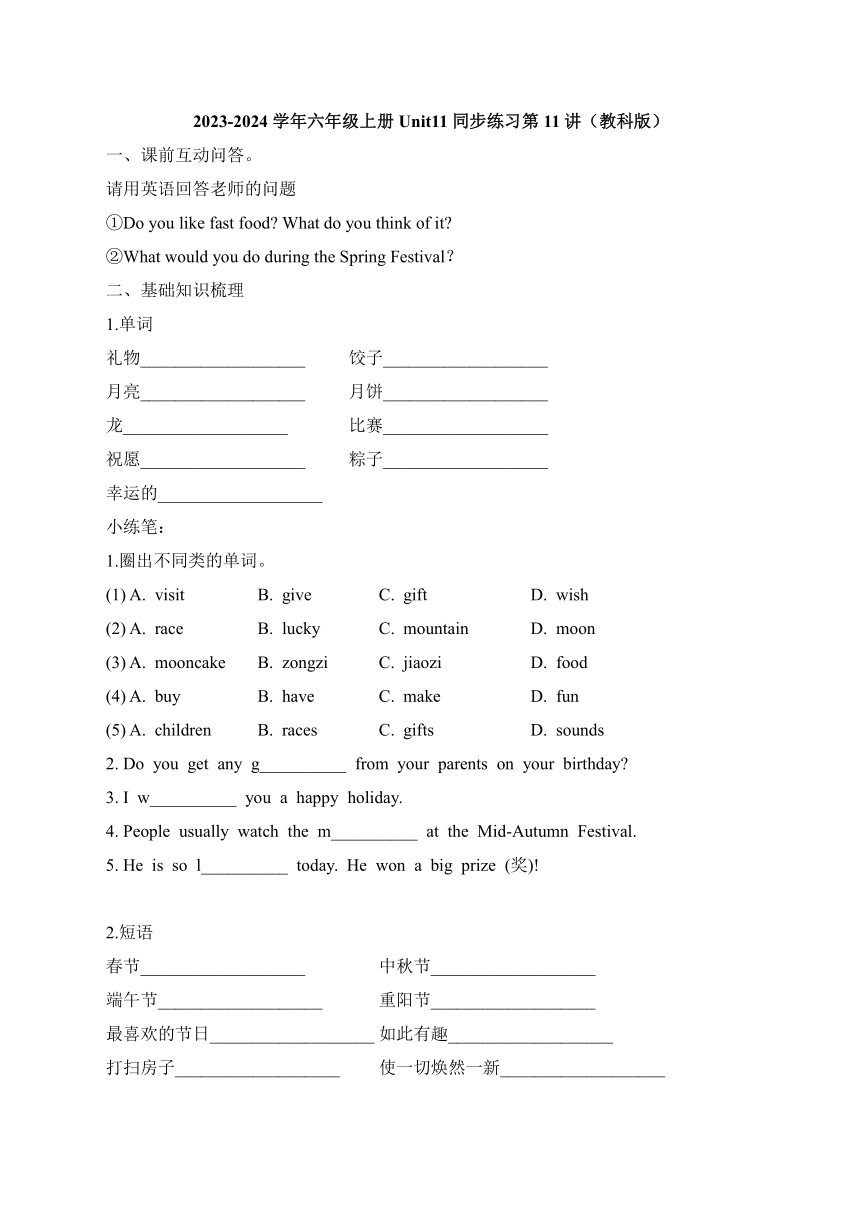
|
|
| 格式 | docx | ||
| 文件大小 | 37.5KB | ||
| 资源类型 | 教案 | ||
| 版本资源 | 教科版(广州) | ||
| 科目 | 英语 | ||
| 更新时间 | 2023-09-06 12:40:00 | ||
图片预览

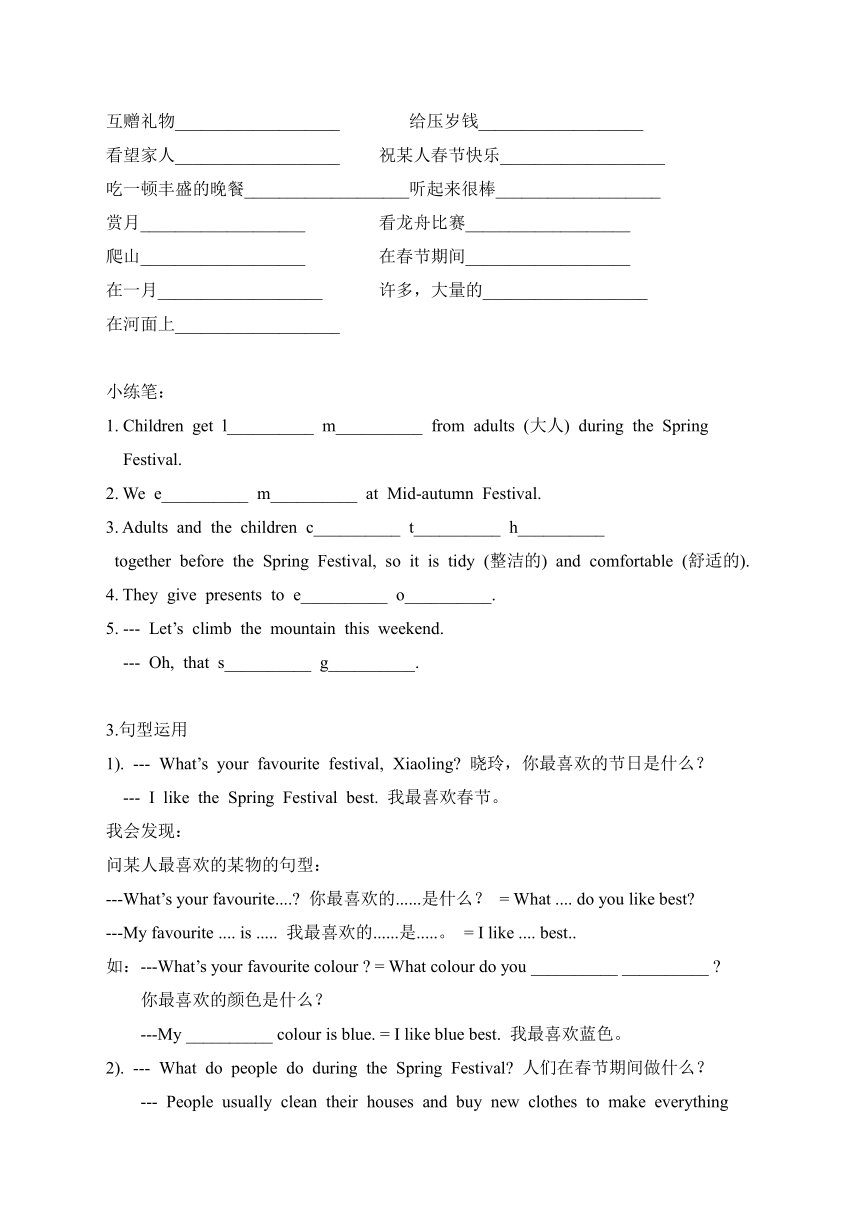
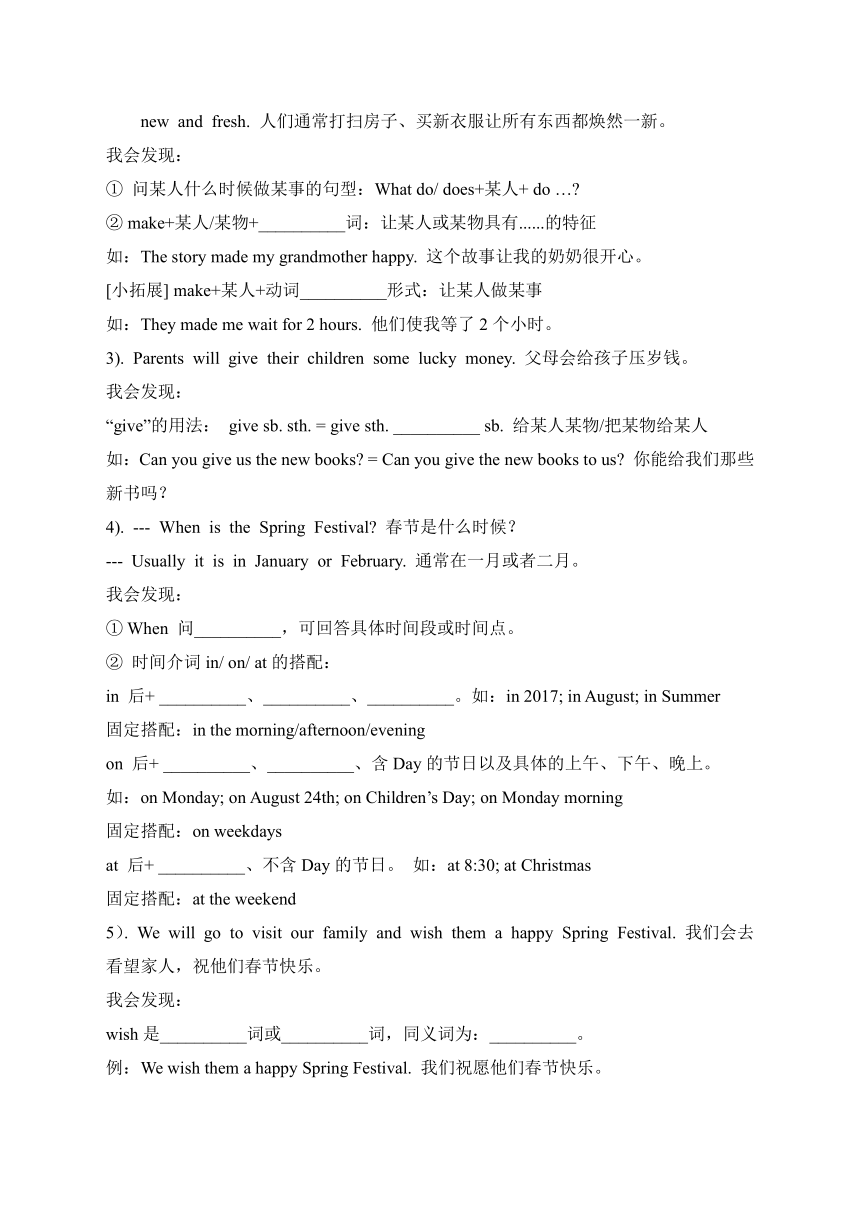
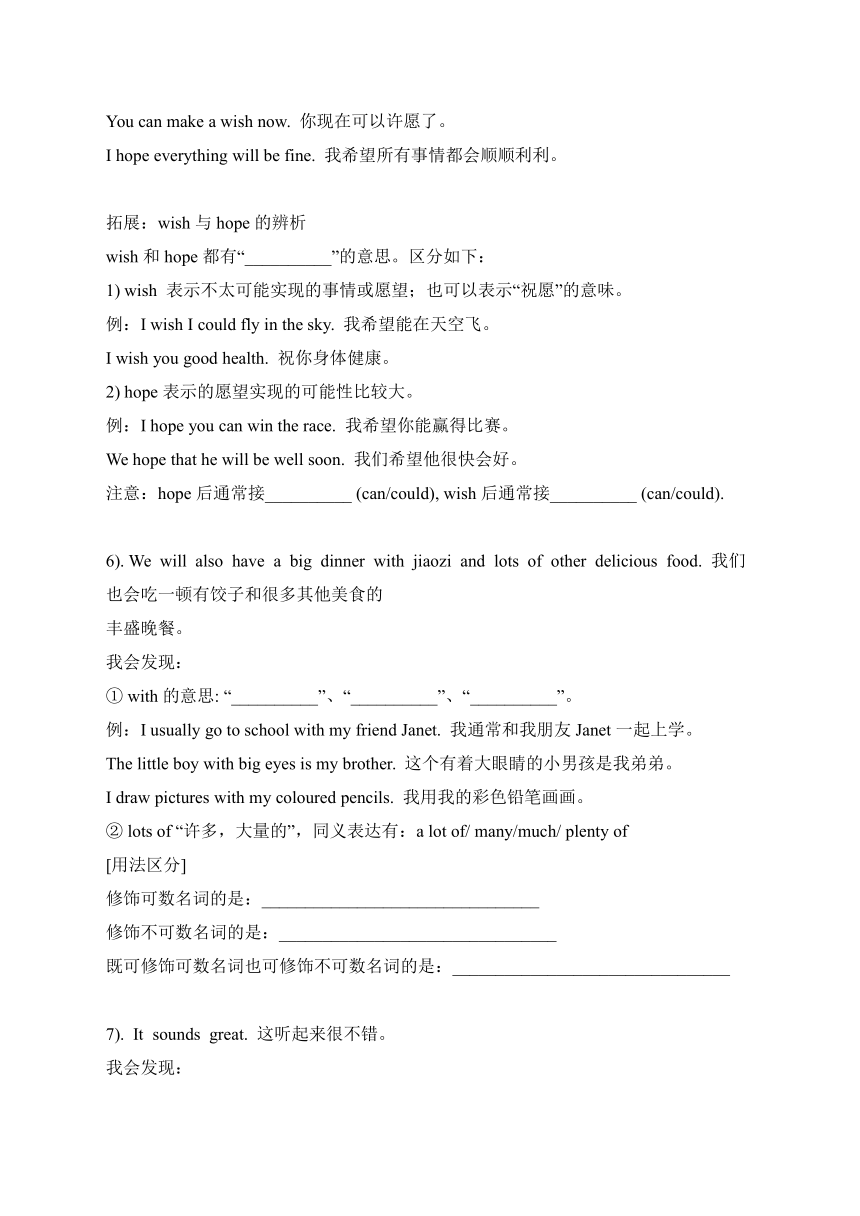
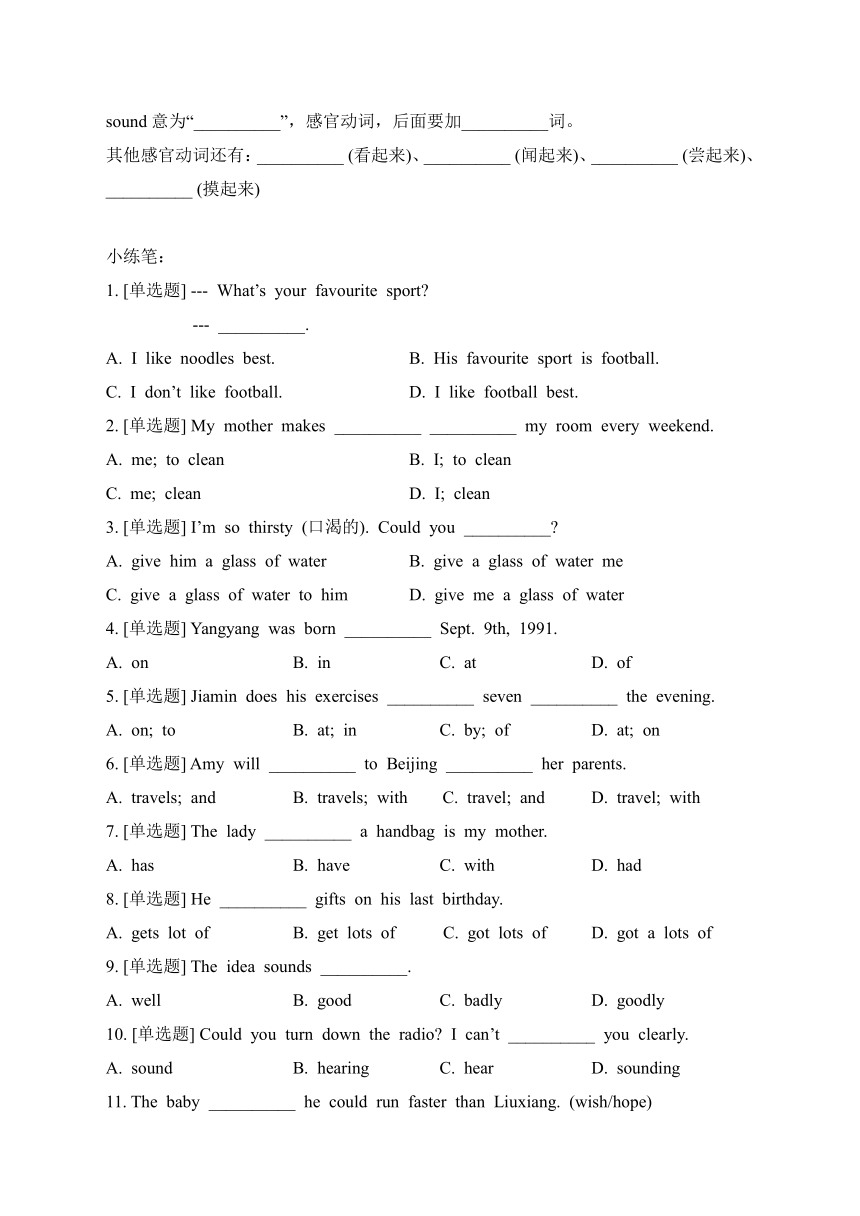
文档简介
2023-2024学年六年级上册Unit11同步练习第11讲(教科版)
一、课前互动问答。
请用英语回答老师的问题
①Do you like fast food What do you think of it
②What would you do during the Spring Festival?
二、基础知识梳理
1.单词
礼物___________________ 饺子___________________
月亮___________________ 月饼___________________
龙___________________ 比赛___________________
祝愿___________________ 粽子___________________
幸运的___________________
小练笔:
1.圈出不同类的单词。
(1) A. visit B. give C. gift D. wish
(2) A. race B. lucky C. mountain D. moon
(3) A. mooncake B. zongzi C. jiaozi D. food
(4) A. buy B. have C. make D. fun
(5) A. children B. races C. gifts D. sounds
2. Do you get any g__________ from your parents on your birthday
3. I w__________ you a happy holiday.
4. People usually watch the m__________ at the Mid-Autumn Festival.
5. He is so l__________ today. He won a big prize (奖)!
2.短语
春节___________________ 中秋节___________________
端午节___________________ 重阳节___________________
最喜欢的节日___________________ 如此有趣___________________
打扫房子___________________ 使一切焕然一新___________________
互赠礼物___________________ 给压岁钱___________________
看望家人___________________ 祝某人春节快乐___________________
吃一顿丰盛的晚餐___________________听起来很棒___________________
赏月___________________ 看龙舟比赛___________________
爬山___________________ 在春节期间___________________
在一月___________________ 许多,大量的___________________
在河面上___________________
小练笔:
1. Children get l__________ m__________ from adults (大人) during the Spring
Festival.
2. We e__________ m__________ at Mid-autumn Festival.
3. Adults and the children c__________ t__________ h__________
together before the Spring Festival, so it is tidy (整洁的) and comfortable (舒适的).
4. They give presents to e__________ o__________.
5. --- Let’s climb the mountain this weekend.
--- Oh, that s__________ g__________.
3.句型运用
1). --- What’s your favourite festival, Xiaoling 晓玲,你最喜欢的节日是什么?
--- I like the Spring Festival best. 我最喜欢春节。
我会发现:
问某人最喜欢的某物的句型:
---What’s your favourite.... 你最喜欢的......是什么? = What .... do you like best
---My favourite .... is ..... 我最喜欢的......是.....。 = I like .... best..
如:---What’s your favourite colour = What colour do you __________ __________
你最喜欢的颜色是什么?
---My __________ colour is blue. = I like blue best. 我最喜欢蓝色。
2). --- What do people do during the Spring Festival 人们在春节期间做什么?
--- People usually clean their houses and buy new clothes to make everything
new and fresh. 人们通常打扫房子、买新衣服让所有东西都焕然一新。
我会发现:
① 问某人什么时候做某事的句型:What do/ does+某人+ do …
② make+某人/某物+__________词:让某人或某物具有......的特征
如:The story made my grandmother happy. 这个故事让我的奶奶很开心。
[小拓展] make+某人+动词__________形式:让某人做某事
如:They made me wait for 2 hours. 他们使我等了2个小时。
3). Parents will give their children some lucky money. 父母会给孩子压岁钱。
我会发现:
“give”的用法: give sb. sth. = give sth. __________ sb. 给某人某物/把某物给某人
如:Can you give us the new books = Can you give the new books to us 你能给我们那些新书吗?
4). --- When is the Spring Festival 春节是什么时候?
--- Usually it is in January or February. 通常在一月或者二月。
我会发现:
① When 问__________,可回答具体时间段或时间点。
② 时间介词in/ on/ at的搭配:
in 后+ __________、__________、__________。如:in 2017; in August; in Summer
固定搭配:in the morning/afternoon/evening
on 后+ __________、__________、含Day的节日以及具体的上午、下午、晚上。
如:on Monday; on August 24th; on Children’s Day; on Monday morning
固定搭配:on weekdays
at 后+ __________、不含Day的节日。 如:at 8:30; at Christmas
固定搭配:at the weekend
5). We will go to visit our family and wish them a happy Spring Festival. 我们会去看望家人,祝他们春节快乐。
我会发现:
wish是__________词或__________词,同义词为:__________。
例:We wish them a happy Spring Festival. 我们祝愿他们春节快乐。
You can make a wish now. 你现在可以许愿了。
I hope everything will be fine. 我希望所有事情都会顺顺利利。
拓展:wish与hope的辨析
wish和hope都有“__________”的意思。区分如下:
1) wish 表示不太可能实现的事情或愿望;也可以表示“祝愿”的意味。
例:I wish I could fly in the sky. 我希望能在天空飞。
I wish you good health. 祝你身体健康。
2) hope表示的愿望实现的可能性比较大。
例:I hope you can win the race. 我希望你能赢得比赛。
We hope that he will be well soon. 我们希望他很快会好。
注意:hope后通常接__________ (can/could), wish后通常接__________ (can/could).
6). We will also have a big dinner with jiaozi and lots of other delicious food. 我们也会吃一顿有饺子和很多其他美食的
丰盛晚餐。
我会发现:
① with的意思: “__________”、“__________”、“__________”。
例:I usually go to school with my friend Janet. 我通常和我朋友Janet一起上学。
The little boy with big eyes is my brother. 这个有着大眼睛的小男孩是我弟弟。
I draw pictures with my coloured pencils. 我用我的彩色铅笔画画。
② lots of “许多,大量的”,同义表达有:a lot of/ many/much/ plenty of
[用法区分]
修饰可数名词的是:________________________________
修饰不可数名词的是:________________________________
既可修饰可数名词也可修饰不可数名词的是:________________________________
7). It sounds great. 这听起来很不错。
我会发现:
sound意为“__________”,感官动词,后面要加__________词。
其他感官动词还有:__________ (看起来)、__________ (闻起来)、__________ (尝起来)、__________ (摸起来)
小练笔:
1. [单选题] --- What’s your favourite sport
--- __________.
A. I like noodles best. B. His favourite sport is football.
C. I don’t like football. D. I like football best.
2. [单选题] My mother makes __________ __________ my room every weekend.
A. me; to clean B. I; to clean
C. me; clean D. I; clean
3. [单选题] I’m so thirsty (口渴的). Could you __________
A. give him a glass of water B. give a glass of water me
C. give a glass of water to him D. give me a glass of water
4. [单选题] Yangyang was born __________ Sept. 9th, 1991.
A. on B. in C. at D. of
5. [单选题] Jiamin does his exercises __________ seven __________ the evening.
A. on; to B. at; in C. by; of D. at; on
6. [单选题] Amy will __________ to Beijing __________ her parents.
A. travels; and B. travels; with C. travel; and D. travel; with
7. [单选题] The lady __________ a handbag is my mother.
A. has B. have C. with D. had
8. [单选题] He __________ gifts on his last birthday.
A. gets lot of B. get lots of C. got lots of D. got a lots of
9. [单选题] The idea sounds __________.
A. well B. good C. badly D. goodly
10. [单选题] Could you turn down the radio I can’t __________ you clearly.
A. sound B. hearing C. hear D. sounding
11. The baby __________ he could run faster than Liuxiang. (wish/hope)
12. We __________ our team can win the football game. (wish/hope)
三、语法
一般将来时
我会观察:
(1) We will have a big dinner with jiaozi and lots of other delicious food.
(2) She is going to stay at home tomorrow.
(3) I will write to him next week.
(4) She is not going to stay at home tomorrow.
(5) Is she going to stay at home tomorrow
(6) I will not write to him next week.
(7) Will you write to him next week
(8) What is she going to do tomorrow
(9) There is going to be a football match next Sunday.
(10) There will be a football match next Sunday.
我发现了:一般将来时用法归纳
1) 意义:表示 _______________ 的动作或情况
2) 时间标志:________________________________________
3) 常用的两种结构:① _______________ +动词___________ (形式)
② _______________ +动词___________ (形式)
4) 句型转换口诀:_________________________________________
变否定句,在__________ 或__________后直接加 __________;
变一般疑问句,把__________ 或__________ 提到 __________。
5) 特殊疑问句:__________________词 (wh-) + 一般疑问句
6) 拓展:there be 句型的一般将来时
There is / are going to be...
There will be...
小练笔:
1. [单选题] Charlie __________ here next month.
A. isn’t working B. doesn’t working
C. isn’t going to working D. won’t work
2. [单选题] There __________ a dolphin show (海豚表演) in the zoo tomorrow
evening.
A. was B. is going to have C. will have D. is going to be
3. [单选题] --- __________ you __________ free (有空的) tomorrow
--- No. I __________ free the day after tomorrow.
A. Are, going to, will B. Are, going to be, will
C. Are, going to, will be D. Are, going to be, will be
复合名词:
1) 概念:由两个或更多的词合成一个词的现象,叫复合词,又称合成词 (词和词之间可以有连字符)。其中复合名词是所有复合词中构词能力最强、最常见的一种。
2) 常见构成方式:
① __________词+__________词,如:hardboard硬纸板; hard candy硬糖; soft drink 软饮料, 汽水
② __________词+__________词,如:dinner table餐桌; football足球; basketball篮球; storybook故事书...
3) 复合名词的复数形式
① 通常以不可数名词结尾的复合名词无复数形式。
如:homework家庭作业;housework 家务事...
② 以man或者woman为前缀的名词变复数时,前后两个名词都变成复数。
如:woman teacher女教师 → women teachers女教师们;
man doctor男医生 → men doctors男医生们...
③ 以两个名词构成的复合名词(前面的名词为man和woman的情况除外),一般把后面的名词变为复数。
如:apple tree → apple trees;paper bag → paper bags...
小练笔:
1. [单选题] There are twenty _________ in our school.
A. man teacher B. man teachers C. men teacher D. men teachers
2. [单选题] We have four __________ in the yard (院子).
A. oranges trees B. orange trees C. oranges tree D. orange tree
3. [单选题] I’m sorry, Jiamin! I have a lot of __________ to do, so I don’t have
time to see a film with you tonight.
A. works B. homework C. milk D. beef
过去进行时:
我会观察:(1) He was sleeping on his bed in his bedroom from 6 o’clock to 8 o’clock last
night.
(2) His parents were watching TV in the living room at 9 o’clock yesterday evening.
(3) I was talking with my sister at this time yesterday.
我会发现:
1) 概念:表示__________ (现在/过去)某时刻__________ (经常/正在)做某事。
2) 结构:主语 + __________/__________ + 动词__________形式
如:We were having breakfast at 7 o’clock yesterday morning. 我们昨天早上七点的时候正在吃早餐。
3) 时间标志:
常与表示过去的时间状语连用。例:Tom was doing his homework at 10 o’clock yesterday evening
小练笔:
1. John _______________ (work) at 5 p.m. yesterday.
2. I _______________ (write) a letter at ten last night.
3. Miss Green _______________ (do) some washing from 9 a.m.to 10 a.m.
last Saturday.
4. We _______________ (walk) home at 10 p.m. yesterday evening.
5. Look! The cat _______________ (sleep) in the tree.
6. --- What _______________ you _______________ (do) at ten o’clock yesterday
--- I _______________ (study) in class.
限时训练:
1. [单选题] --- What’s your sister’s favourite festival
--- She __________ the Mid-autumn Festival _________.
A. likes; good B. like; better C. likes; best D. like; best
2. [单选题] --- Can you __________ the music on the radio
--- Of course, it __________ beautiful.
A. sounds; hear B. sound; hears C. hear; sounds D. hears; sound
3. [单选题] There is __________ rice left. Could you please __________
me some more
A. many; give B. many; gives C. much; give D. much; gives
4. [单选题] Is your mother cooking in the kitchen It __________ so great!
I’m hungry now!
A. tastes B. taste C. smell D. smells
5. [单选题] He __________ basketball _________ his father every weekend.
A. play the; with B. plays; with C. play the; and D. plays; and
6. [单选题] The Chongyang Festival is a festival for _________ in China.
A. young people B. old woman C. old people D. children
7. [单选题] I wish _________ a happy new year.
A. them B. they C. their D. theirs
8. [单选题] I like the interesting book. It makes me _________ the whole day.
A. smiles B. happy C. smiled D. happily
9. [单选题] Children will get __________ lucky money _________
the Spring Festival.
A. lot of; in B. many; on C. much; at D. lots of; of
10. [单选题] They _________ the day before yesterday.
A. gave each other gifts B. give each other gifts
C. gave to gifts each other D. give gifts to each other
11. We like _________ the dragon boat races on the river at Dragon Boat Festival.
A. watch B. watching C. seeing D. see
12. [单选题] People usually clean their houses _________ the Spring Festival.
A. before B. at C. after D. on
13. [单选题] Chinese people love ________ at the Dragon Boat Festival.
A. eating zongzi B. eating jiaozi C. eat zongzi D. eat jiaozi
14. [单选题] __________ an English test (测验) next Saturday.
A. There will be B. Will there be C. There can be D. There are
15. [单选题] My mother __________ breakfast at half past six this morning.
A. was cooking B. cooked C. was cook D. cooks
16. [单选题] --- What do you have on your farm, Uncle Chen
A. fruit tree B. fruits tree C. fruit trees D. a fruit tree
17. I met my old friend __________ a cold winter morning. (in/on/at)
18. __________ the Spring Festival, Children can get lucky money from their
parents. (in/on/at)
19. Children get a lot of presents __________ Children’s Day. (in/on/at)
20. The children __________ their parents can give them more presents on Children’s
Day. (wish/hope)
21. The little girl __________ she could use magic (魔法). (wish/hope)
22. Ben will come to live in China with his parents next year.(改为否定句)
Ben __________ __________ to live in China with his parents next year.
23. We are going to visit some friends this New Year’s Eve. (改为一般疑问句)
__________ __________ __________ __________ __________ __________ friends
this New Year’s Eve
24. There will be a sports meeting in our school. (变成否定句)
__________________________________________________________________________25. Do you like the Spring Festival (按实际情况回答问题)
__________________________________________________________________________
26. When is Children’s Day (按实际情况回答问题)
_________________________________________________________________________
27. Did you get any lucky money last year (按实际情况回答问题)
__________________________________________________________________________
28. What is your favourite festival in a year (按实际情况回答问题)
__________________________________________________________________________
29. 用适当的单词填空,使文段完整。
had; ago; past; went; festival; played; on; happy; to; from; got
Hello, my name is Lily. I am (1)__________ New York. I came to China three
months (2)__________. My favourite (3)__________ in China is Children’s Day, June 1st. (4)__________ that day, I (5)__________ up very early in the morning. I (6)__________ to the Children’s Park at a quarter (7)__________ eight. I (8)__________ many games and (9)__________ lots of fun there. I went back home at half (10)__________ four in the afternoon. I felt tired but very (11)__________.
30. 阅读理解,判断下列句子是否符合文段意思,符合写“T”,否则“F”。
The Spring Festival is the most important festival in China. People are usually busy shopping and cleaning their houses before the festival. On the evening before the
Spring Festival, families get together and have a big meal. Dumplings are the most
important food. Children like the festival very much, because they can have delicious food and wear new clothes. They can also get some lucky money from their
parents. The Spring Festival lasts for about 15 days. People visit families and friends with the words “Have all your wishes”. All the people enjoy the Spring Festival.
(1) Spring Festival is the most important festival in China. ( )
(2) On the evening after the Spring Festival, families get together and have a big
meal. ( )
(3) Jiaozi is the most important food on the evening before the festival. ( )
(4) People usually go shopping and clean their houses before the festival. ( )
(5) Children like the Spring Festival because they can have delicious food,wear new clothes and get lucky money. ( )
(6) The Spring Festival lasts for more than two weeks. ( )
(7) Only children can enjoy the Spring Festival. ( )
答案:30.(1) T; (2) F; (3) T; (4) T; (5) T; (6) T; (7) F
一、课前互动问答。
请用英语回答老师的问题
①Do you like fast food What do you think of it
②What would you do during the Spring Festival?
二、基础知识梳理
1.单词
礼物___________________ 饺子___________________
月亮___________________ 月饼___________________
龙___________________ 比赛___________________
祝愿___________________ 粽子___________________
幸运的___________________
小练笔:
1.圈出不同类的单词。
(1) A. visit B. give C. gift D. wish
(2) A. race B. lucky C. mountain D. moon
(3) A. mooncake B. zongzi C. jiaozi D. food
(4) A. buy B. have C. make D. fun
(5) A. children B. races C. gifts D. sounds
2. Do you get any g__________ from your parents on your birthday
3. I w__________ you a happy holiday.
4. People usually watch the m__________ at the Mid-Autumn Festival.
5. He is so l__________ today. He won a big prize (奖)!
2.短语
春节___________________ 中秋节___________________
端午节___________________ 重阳节___________________
最喜欢的节日___________________ 如此有趣___________________
打扫房子___________________ 使一切焕然一新___________________
互赠礼物___________________ 给压岁钱___________________
看望家人___________________ 祝某人春节快乐___________________
吃一顿丰盛的晚餐___________________听起来很棒___________________
赏月___________________ 看龙舟比赛___________________
爬山___________________ 在春节期间___________________
在一月___________________ 许多,大量的___________________
在河面上___________________
小练笔:
1. Children get l__________ m__________ from adults (大人) during the Spring
Festival.
2. We e__________ m__________ at Mid-autumn Festival.
3. Adults and the children c__________ t__________ h__________
together before the Spring Festival, so it is tidy (整洁的) and comfortable (舒适的).
4. They give presents to e__________ o__________.
5. --- Let’s climb the mountain this weekend.
--- Oh, that s__________ g__________.
3.句型运用
1). --- What’s your favourite festival, Xiaoling 晓玲,你最喜欢的节日是什么?
--- I like the Spring Festival best. 我最喜欢春节。
我会发现:
问某人最喜欢的某物的句型:
---What’s your favourite.... 你最喜欢的......是什么? = What .... do you like best
---My favourite .... is ..... 我最喜欢的......是.....。 = I like .... best..
如:---What’s your favourite colour = What colour do you __________ __________
你最喜欢的颜色是什么?
---My __________ colour is blue. = I like blue best. 我最喜欢蓝色。
2). --- What do people do during the Spring Festival 人们在春节期间做什么?
--- People usually clean their houses and buy new clothes to make everything
new and fresh. 人们通常打扫房子、买新衣服让所有东西都焕然一新。
我会发现:
① 问某人什么时候做某事的句型:What do/ does+某人+ do …
② make+某人/某物+__________词:让某人或某物具有......的特征
如:The story made my grandmother happy. 这个故事让我的奶奶很开心。
[小拓展] make+某人+动词__________形式:让某人做某事
如:They made me wait for 2 hours. 他们使我等了2个小时。
3). Parents will give their children some lucky money. 父母会给孩子压岁钱。
我会发现:
“give”的用法: give sb. sth. = give sth. __________ sb. 给某人某物/把某物给某人
如:Can you give us the new books = Can you give the new books to us 你能给我们那些新书吗?
4). --- When is the Spring Festival 春节是什么时候?
--- Usually it is in January or February. 通常在一月或者二月。
我会发现:
① When 问__________,可回答具体时间段或时间点。
② 时间介词in/ on/ at的搭配:
in 后+ __________、__________、__________。如:in 2017; in August; in Summer
固定搭配:in the morning/afternoon/evening
on 后+ __________、__________、含Day的节日以及具体的上午、下午、晚上。
如:on Monday; on August 24th; on Children’s Day; on Monday morning
固定搭配:on weekdays
at 后+ __________、不含Day的节日。 如:at 8:30; at Christmas
固定搭配:at the weekend
5). We will go to visit our family and wish them a happy Spring Festival. 我们会去看望家人,祝他们春节快乐。
我会发现:
wish是__________词或__________词,同义词为:__________。
例:We wish them a happy Spring Festival. 我们祝愿他们春节快乐。
You can make a wish now. 你现在可以许愿了。
I hope everything will be fine. 我希望所有事情都会顺顺利利。
拓展:wish与hope的辨析
wish和hope都有“__________”的意思。区分如下:
1) wish 表示不太可能实现的事情或愿望;也可以表示“祝愿”的意味。
例:I wish I could fly in the sky. 我希望能在天空飞。
I wish you good health. 祝你身体健康。
2) hope表示的愿望实现的可能性比较大。
例:I hope you can win the race. 我希望你能赢得比赛。
We hope that he will be well soon. 我们希望他很快会好。
注意:hope后通常接__________ (can/could), wish后通常接__________ (can/could).
6). We will also have a big dinner with jiaozi and lots of other delicious food. 我们也会吃一顿有饺子和很多其他美食的
丰盛晚餐。
我会发现:
① with的意思: “__________”、“__________”、“__________”。
例:I usually go to school with my friend Janet. 我通常和我朋友Janet一起上学。
The little boy with big eyes is my brother. 这个有着大眼睛的小男孩是我弟弟。
I draw pictures with my coloured pencils. 我用我的彩色铅笔画画。
② lots of “许多,大量的”,同义表达有:a lot of/ many/much/ plenty of
[用法区分]
修饰可数名词的是:________________________________
修饰不可数名词的是:________________________________
既可修饰可数名词也可修饰不可数名词的是:________________________________
7). It sounds great. 这听起来很不错。
我会发现:
sound意为“__________”,感官动词,后面要加__________词。
其他感官动词还有:__________ (看起来)、__________ (闻起来)、__________ (尝起来)、__________ (摸起来)
小练笔:
1. [单选题] --- What’s your favourite sport
--- __________.
A. I like noodles best. B. His favourite sport is football.
C. I don’t like football. D. I like football best.
2. [单选题] My mother makes __________ __________ my room every weekend.
A. me; to clean B. I; to clean
C. me; clean D. I; clean
3. [单选题] I’m so thirsty (口渴的). Could you __________
A. give him a glass of water B. give a glass of water me
C. give a glass of water to him D. give me a glass of water
4. [单选题] Yangyang was born __________ Sept. 9th, 1991.
A. on B. in C. at D. of
5. [单选题] Jiamin does his exercises __________ seven __________ the evening.
A. on; to B. at; in C. by; of D. at; on
6. [单选题] Amy will __________ to Beijing __________ her parents.
A. travels; and B. travels; with C. travel; and D. travel; with
7. [单选题] The lady __________ a handbag is my mother.
A. has B. have C. with D. had
8. [单选题] He __________ gifts on his last birthday.
A. gets lot of B. get lots of C. got lots of D. got a lots of
9. [单选题] The idea sounds __________.
A. well B. good C. badly D. goodly
10. [单选题] Could you turn down the radio I can’t __________ you clearly.
A. sound B. hearing C. hear D. sounding
11. The baby __________ he could run faster than Liuxiang. (wish/hope)
12. We __________ our team can win the football game. (wish/hope)
三、语法
一般将来时
我会观察:
(1) We will have a big dinner with jiaozi and lots of other delicious food.
(2) She is going to stay at home tomorrow.
(3) I will write to him next week.
(4) She is not going to stay at home tomorrow.
(5) Is she going to stay at home tomorrow
(6) I will not write to him next week.
(7) Will you write to him next week
(8) What is she going to do tomorrow
(9) There is going to be a football match next Sunday.
(10) There will be a football match next Sunday.
我发现了:一般将来时用法归纳
1) 意义:表示 _______________ 的动作或情况
2) 时间标志:________________________________________
3) 常用的两种结构:① _______________ +动词___________ (形式)
② _______________ +动词___________ (形式)
4) 句型转换口诀:_________________________________________
变否定句,在__________ 或__________后直接加 __________;
变一般疑问句,把__________ 或__________ 提到 __________。
5) 特殊疑问句:__________________词 (wh-) + 一般疑问句
6) 拓展:there be 句型的一般将来时
There is / are going to be...
There will be...
小练笔:
1. [单选题] Charlie __________ here next month.
A. isn’t working B. doesn’t working
C. isn’t going to working D. won’t work
2. [单选题] There __________ a dolphin show (海豚表演) in the zoo tomorrow
evening.
A. was B. is going to have C. will have D. is going to be
3. [单选题] --- __________ you __________ free (有空的) tomorrow
--- No. I __________ free the day after tomorrow.
A. Are, going to, will B. Are, going to be, will
C. Are, going to, will be D. Are, going to be, will be
复合名词:
1) 概念:由两个或更多的词合成一个词的现象,叫复合词,又称合成词 (词和词之间可以有连字符)。其中复合名词是所有复合词中构词能力最强、最常见的一种。
2) 常见构成方式:
① __________词+__________词,如:hardboard硬纸板; hard candy硬糖; soft drink 软饮料, 汽水
② __________词+__________词,如:dinner table餐桌; football足球; basketball篮球; storybook故事书...
3) 复合名词的复数形式
① 通常以不可数名词结尾的复合名词无复数形式。
如:homework家庭作业;housework 家务事...
② 以man或者woman为前缀的名词变复数时,前后两个名词都变成复数。
如:woman teacher女教师 → women teachers女教师们;
man doctor男医生 → men doctors男医生们...
③ 以两个名词构成的复合名词(前面的名词为man和woman的情况除外),一般把后面的名词变为复数。
如:apple tree → apple trees;paper bag → paper bags...
小练笔:
1. [单选题] There are twenty _________ in our school.
A. man teacher B. man teachers C. men teacher D. men teachers
2. [单选题] We have four __________ in the yard (院子).
A. oranges trees B. orange trees C. oranges tree D. orange tree
3. [单选题] I’m sorry, Jiamin! I have a lot of __________ to do, so I don’t have
time to see a film with you tonight.
A. works B. homework C. milk D. beef
过去进行时:
我会观察:(1) He was sleeping on his bed in his bedroom from 6 o’clock to 8 o’clock last
night.
(2) His parents were watching TV in the living room at 9 o’clock yesterday evening.
(3) I was talking with my sister at this time yesterday.
我会发现:
1) 概念:表示__________ (现在/过去)某时刻__________ (经常/正在)做某事。
2) 结构:主语 + __________/__________ + 动词__________形式
如:We were having breakfast at 7 o’clock yesterday morning. 我们昨天早上七点的时候正在吃早餐。
3) 时间标志:
常与表示过去的时间状语连用。例:Tom was doing his homework at 10 o’clock yesterday evening
小练笔:
1. John _______________ (work) at 5 p.m. yesterday.
2. I _______________ (write) a letter at ten last night.
3. Miss Green _______________ (do) some washing from 9 a.m.to 10 a.m.
last Saturday.
4. We _______________ (walk) home at 10 p.m. yesterday evening.
5. Look! The cat _______________ (sleep) in the tree.
6. --- What _______________ you _______________ (do) at ten o’clock yesterday
--- I _______________ (study) in class.
限时训练:
1. [单选题] --- What’s your sister’s favourite festival
--- She __________ the Mid-autumn Festival _________.
A. likes; good B. like; better C. likes; best D. like; best
2. [单选题] --- Can you __________ the music on the radio
--- Of course, it __________ beautiful.
A. sounds; hear B. sound; hears C. hear; sounds D. hears; sound
3. [单选题] There is __________ rice left. Could you please __________
me some more
A. many; give B. many; gives C. much; give D. much; gives
4. [单选题] Is your mother cooking in the kitchen It __________ so great!
I’m hungry now!
A. tastes B. taste C. smell D. smells
5. [单选题] He __________ basketball _________ his father every weekend.
A. play the; with B. plays; with C. play the; and D. plays; and
6. [单选题] The Chongyang Festival is a festival for _________ in China.
A. young people B. old woman C. old people D. children
7. [单选题] I wish _________ a happy new year.
A. them B. they C. their D. theirs
8. [单选题] I like the interesting book. It makes me _________ the whole day.
A. smiles B. happy C. smiled D. happily
9. [单选题] Children will get __________ lucky money _________
the Spring Festival.
A. lot of; in B. many; on C. much; at D. lots of; of
10. [单选题] They _________ the day before yesterday.
A. gave each other gifts B. give each other gifts
C. gave to gifts each other D. give gifts to each other
11. We like _________ the dragon boat races on the river at Dragon Boat Festival.
A. watch B. watching C. seeing D. see
12. [单选题] People usually clean their houses _________ the Spring Festival.
A. before B. at C. after D. on
13. [单选题] Chinese people love ________ at the Dragon Boat Festival.
A. eating zongzi B. eating jiaozi C. eat zongzi D. eat jiaozi
14. [单选题] __________ an English test (测验) next Saturday.
A. There will be B. Will there be C. There can be D. There are
15. [单选题] My mother __________ breakfast at half past six this morning.
A. was cooking B. cooked C. was cook D. cooks
16. [单选题] --- What do you have on your farm, Uncle Chen
A. fruit tree B. fruits tree C. fruit trees D. a fruit tree
17. I met my old friend __________ a cold winter morning. (in/on/at)
18. __________ the Spring Festival, Children can get lucky money from their
parents. (in/on/at)
19. Children get a lot of presents __________ Children’s Day. (in/on/at)
20. The children __________ their parents can give them more presents on Children’s
Day. (wish/hope)
21. The little girl __________ she could use magic (魔法). (wish/hope)
22. Ben will come to live in China with his parents next year.(改为否定句)
Ben __________ __________ to live in China with his parents next year.
23. We are going to visit some friends this New Year’s Eve. (改为一般疑问句)
__________ __________ __________ __________ __________ __________ friends
this New Year’s Eve
24. There will be a sports meeting in our school. (变成否定句)
__________________________________________________________________________25. Do you like the Spring Festival (按实际情况回答问题)
__________________________________________________________________________
26. When is Children’s Day (按实际情况回答问题)
_________________________________________________________________________
27. Did you get any lucky money last year (按实际情况回答问题)
__________________________________________________________________________
28. What is your favourite festival in a year (按实际情况回答问题)
__________________________________________________________________________
29. 用适当的单词填空,使文段完整。
had; ago; past; went; festival; played; on; happy; to; from; got
Hello, my name is Lily. I am (1)__________ New York. I came to China three
months (2)__________. My favourite (3)__________ in China is Children’s Day, June 1st. (4)__________ that day, I (5)__________ up very early in the morning. I (6)__________ to the Children’s Park at a quarter (7)__________ eight. I (8)__________ many games and (9)__________ lots of fun there. I went back home at half (10)__________ four in the afternoon. I felt tired but very (11)__________.
30. 阅读理解,判断下列句子是否符合文段意思,符合写“T”,否则“F”。
The Spring Festival is the most important festival in China. People are usually busy shopping and cleaning their houses before the festival. On the evening before the
Spring Festival, families get together and have a big meal. Dumplings are the most
important food. Children like the festival very much, because they can have delicious food and wear new clothes. They can also get some lucky money from their
parents. The Spring Festival lasts for about 15 days. People visit families and friends with the words “Have all your wishes”. All the people enjoy the Spring Festival.
(1) Spring Festival is the most important festival in China. ( )
(2) On the evening after the Spring Festival, families get together and have a big
meal. ( )
(3) Jiaozi is the most important food on the evening before the festival. ( )
(4) People usually go shopping and clean their houses before the festival. ( )
(5) Children like the Spring Festival because they can have delicious food,wear new clothes and get lucky money. ( )
(6) The Spring Festival lasts for more than two weeks. ( )
(7) Only children can enjoy the Spring Festival. ( )
答案:30.(1) T; (2) F; (3) T; (4) T; (5) T; (6) T; (7) F
同课章节目录
- Module 1 Country life
- Unit 1 What are those farmers doing?
- Unit 2 A country life is a healthy life
- Module 2 City life
- Unit 3 Where are you from?
- Unit 4 I like the city very much
- Module 3 Health
- Unit 5 What's the matter with you?
- Unit 6 The secret of good health
- Module 4 Past experiences
- Unit 7 What did you do yesterday?
- Unit 8 A trip to Hong Kong
- Module 5 Changes
- Unit 9 Was I a good girl back then?
- Unit 10 Then and now
- Module 6 Festivals
- Unit 11 I like the Spring Festival best
- Unit 12 Other festival in China
- Unit 12 Christmas(旧版)
- Module 7 Let's look back
